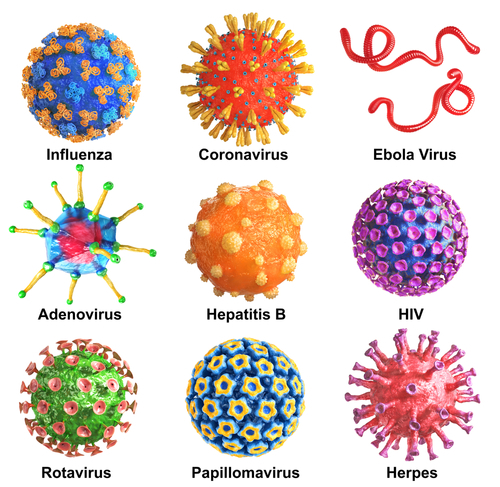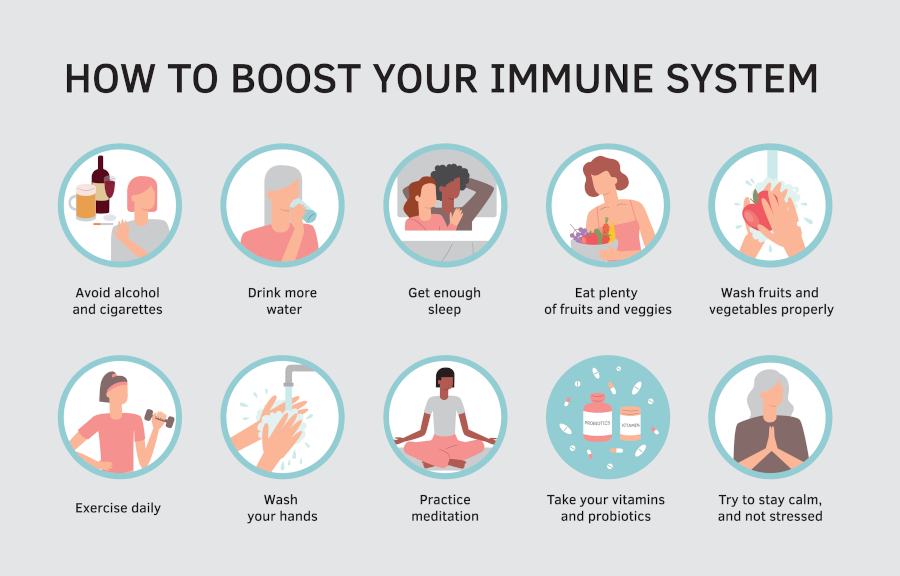Understanding the Immune System for Dummies

Most people know that the immune system is something that protects us against sickness and that by making healthy lifestyle choices, we help it function better. But many times, our knowledge ends there, and we don't have a complete understanding of what the immune system is and how it functions.
In this article, we will provide a basic overview of the immune system. The immune system is one of the most important parts of the body and understanding its function can help you see why it is vital for your health.
The information provided in this article will be sourced in large part from the U.S. Department of Health and Human Services guide on the Immune System. Further details will also be provided by the International Union of Immunological Societies, whose aim is to promote understanding in Immunology, the study of the immune system.
What is the function of the Immune System?
The immune system's role is to protect your body from outside substances that may harm you. These outside substances can include pathogens (viruses, bacteria, other microbes) chemicals, toxins, and even pollen. One of the key functions of the immune system is that it can identify materials that are not a normal part of your body and take steps to deal with them without causing you harm.
Your immune system makes this distinction by differentiating between self and nonself. Your immune system, when functioning properly, understands which cells are yours (self), and which ones are foreign to your body (nonself). This is the key to a healthy immune system.
This function is important, because we come into contact with many different foreign substances throughout our lives, even in a single day. Bacteria, viruses, parasites, and fungi exist plentifully around us, and cannot all be reasonably avoided.
Some of these substances have the potential to cause great harm if they are allowed to enter and multiply in your body. Your immune system activates upon detecting these foreign substances and mobilizes its entire network to come up with the best response to them.
These substances that stimulate an immune response are known as antigens. When a properly functioning immune system detects antigens, they produce proteins called antibodies to fight them off. These antibodies are produced with specific attributes that only attack antigens and leave healthy cells alone.
What are the Parts of the Immune System?
The immune system consists of many organs that exist all across the body. These organs are specifically referred to as lymphoid organs because they house lymphocytes, which are the key components of the immune system.
The primary organs that produce lymphocytes are bone marrow and the thymus. The secondary organs in the immune system include the spleen, the tonsils, lymph nodes, and some other tissues in the body. The lymphocytes produced in the bone marrow and thymus use these secondary organs to host their fight against antigens.
You may have experienced swollen tonsils or heard your doctor say that your lymph nodes were swollen when you were sick. These are signs of infection, and that your immune system has activated in response to these antigens.
The immune system plays host to many different cells, but your body is not flooded with antibodies for every virus all the time. Instead, when your body detects the presence of an antigen, if it has experienced it before, it mobilizes the appropriate cells and multiplies them to fight off the specific infection. Otherwise, it attempts to identify this new antigen and mount the appropriate response.
Subsystems
The Immune system can be further broken down into two subsystems, the innate or nonspecific immune system, and the adaptive or specific immune system.
Innate (Non-Specific) Immune System
As its name suggests, the non-specific immune system offers general protection against all types of infection and not any particular antigen. This innate immune system offers several lines of defense that attempt to keep harmful substances from entering your body.
The First Line of Defense includes:
- The Skin - This acts as a physical barrier against foreign substances entering your body.
- Saliva, Mucus, and Tears - These all contain an enzyme that breaks down bacterial cell walls.
If a substance happens to pass the first line of defense and enters your body, The Second line of Defense includes:
- An Inflammatory Response - this occurs when a pathogen triggers an increase of blood flow to an area. White blood cells flood the area in an attempt to destroy the pathogen.
- Fever - when a pathogen has entered your system, the immune system may also respond by releasing chemicals that increase your body temperature in an attempt to slow down pathogens or speed up the immune response.
This innate immune system is one that most people are born with, so it is your body's natural immunity and not a learned response. The Immune system that is acquired through life and exposure to new antigens, is the adaptive or specific immune system.
Adaptive (specific) immune system
The adaptive immune system is developed in response to antigens that you encounter during your life. When your body needs further help fighting antigens that your innate immune system can't handle alone, the adaptive immune system kicks in.
When the adaptive immune system detects a new antigen, it begins to create antibodies that are designed to counteract these specific antigens and the disease they cause. This is also why our bodies can fight future infections from the same antigen because our adaptive immune system learns and stores information about the disease in case it needs to be used again later.
The adaptive immune system can also learn to fight antigens from vaccines. Vaccines help teach our adaptive immune system to fight a specific disease in case we ever come into contact with it, without the need to be infected first.
How does the immune system respond to attacks?
The immune system has a very complex job, and it requires the help of many different types of cells produced and maintained in this system. We mentioned lymphocytes before, but phagocytes and related cells are also important to the immune response.
Lymphocytes are cells made to specifically target certain pathogens and are produced by the immune system, while phagocytes can target any foreign substances. While having general protectors like phagocytes are nice, the strength of the immune system is the ability to mobilize special defenders.
When an antigen is recognized by your immune system, it can communicate to the cells programmed to deal with that antigen, and cause them to multiply extensively, mounting an immune response designed to attack and remove this infection from your body.
These specially designated lymphocytes fall into two main categories, B Cells, and T Cells.
B Cells
The main duty of the B cell is to produce and secrete antibodies. These antibodies identify and target antigens in your bloodstream. Each B Cell handles one specific antibody, so it waits to activate until its predetermined antigen appears.
When a B cell does encounter the appropriate antigen, it matures into larger plasma cells that produce large amounts of identical antibodies to flood the bloodstream. This is how a targeted immune response occurs; B cells are triggered by a specific antigen, they respond by maturing into plasma cells that flood the bloodstream with antibodies, and these antibodies identify the cells needed for destruction.
It is important to notice though, that these antibodies are not responsible for the attack on the targeted cells. This is because they do not have the power to penetrate the cells for an attack or engulf them as a phagocyte could. Instead, this job is left to T cells and others.
T Cells
Helper T cells are usually responsible for one of two functions; helper T cells communicate with other cells and help with the coordination of the immune response, and killer T cells attack cells carrying abnormal substances.
Certain molecules in the body help identify a cell as being foreign to the body, and when a killer T cell recognizes this, it attacks the cell in question, which is one way these problematic substances are removed from the body during an immune response.
What is Immunity?
The goal of the immune system, beyond just responding to an attack, is to provide lasting protection for you. Immunity is when your body has antibodies for a disease, and they remain within your system. There are two different types of immunity: Active and Passive.
Active Immunity
Active immunity is the result of antibodies being produced in response to the immune system being triggered by an antigen. This can occur by natural exposure to an antigen or be induced by a vaccine. Vaccine-induced immunity will introduce an antigen to your body through a weakened or dead form.
Whichever way you receive active immunity, your body will produce antibodies to the same disease if it recognizes it again, and this protection may even last for life.

Passive Immunity
Passive immunity is the result of a person receiving antibodies from an outside source, rather than producing them through their immune system. This can occur with newborn babies receiving antibodies from their mother through the placenta, or an antibody infusion for someone in need of immediate protection.
This is the advantage that passive immunity has over active immunity. Active immunity needs time to take effect, which while only taking weeks, is much slower than passive immunity which takes effect immediately.
Passive immunity does last for a shorter time, and may only be effective for up to a few months.
What happens when the immune system does not function well?
When discussing the immune system so far, it has been with the idea that it is working as intended, but many people live with immune systems that do not function well. These immune system disorders can range in severity, and some are quite common.
Allergies
Allergies occur because the immune system has a negative response to a usually harmless substance. Many people experience mild allergic responses, but severe allergic reactions can be life-threatening.
Autoimmune Diseases
We discussed before how the recognition of self and nonself is key to a well-functioning immune system. Well, when this recognition fails, autoimmune diseases occur. The body begins to develop antibodies and T cells that target your body's own cells and organs, and the specific targets contribute to many different diseases.
Diabetes can occur when T cells attack healthy pancreas cells and disrupt insulin production. Rheumatoid arthritis is another autoimmune disease caused by T cells attacking the wrong cells in the body. The exact causes for these cases are not clear, but many different factors related to genetics, environment, and lifestyle choices may be related.
Immunodeficiency Disorders
Immunodeficiency disorders will occur when one or more parts of the immune system fail. These disorders can be hereditary, be a side effect of drugs (like cancer medication), or even acquired through an infection.
Some of these can occur on a short-term basis, caused by things like the flu or mono. Stress and smoking can also contribute to temporary immunodeficiency.
The most infamous immunodeficiency disorder is probably AIDS (acquired immunodeficiency syndrome). In this case, HIV is the virus that causes the disorder, infecting immune cells and disabling or even destroying T cells, which allows relentless attacks on an immune system with weakened defenses.
Cancer
Cancers of the immune system occur when cells in the immune system grow uncontrollably. White blood cells, which are normally a helper in the immune system can multiply extensively, causing Leukemia.
Conclusion
A properly functioning immune system is the body's best defense against viruses, bacteria, and other antigens. We come into contact with many different foreign substances daily, and without our immune system, we would be subject to possible infection and negative effects from these substances.
Taking care of your health and making good lifestyle choices means that you are also taking care of your immune system, making sure that it can repay the favor if you ever have an unfortunate encounter with a strange disease.
In case your natural efforts are not enough, it may be time to consult with your doctor and see ifyou can get a prescription online to help take care of your immune system. An online prescription can help you find treatment for some immune issues and ensure that your immune system is functioning correctly.

WARNING: Limitations of Online Doctor/Medical Consultations and Online Prescriptions, QuickRxRefills Cannot and Will NOT Prescribe, Dispense, or Resell any and all medications Narcotics/Controlled Substances (this policy is fully enforced by the Drug Enforcement Administration (DEA)) for Anti-depressants, Pain, Anxiety, Weightloss, Sleep, ADHD/ADD, Anabolic Steroids, Testosterone Replacement Therapy and any and all Medications that contain GabaPentin or Pseudroephedrine including non-controlled substances or any medications that are considered controversial, Off Labeled (Growth Hormone aka HGH) or recalled in nature such (i.e. Retin-A, Accutane). Furthermore, QuickRxRefills is not a substitute for an office based physician in your location nor is it a substitute for Emergency Medical Care or 911. If you do experience a "true" medical emergency your are encouraged to pick up the phone and dial 911 as soon as possible.






